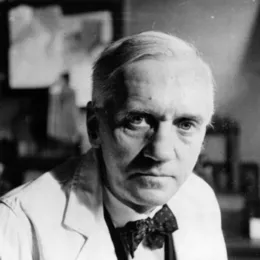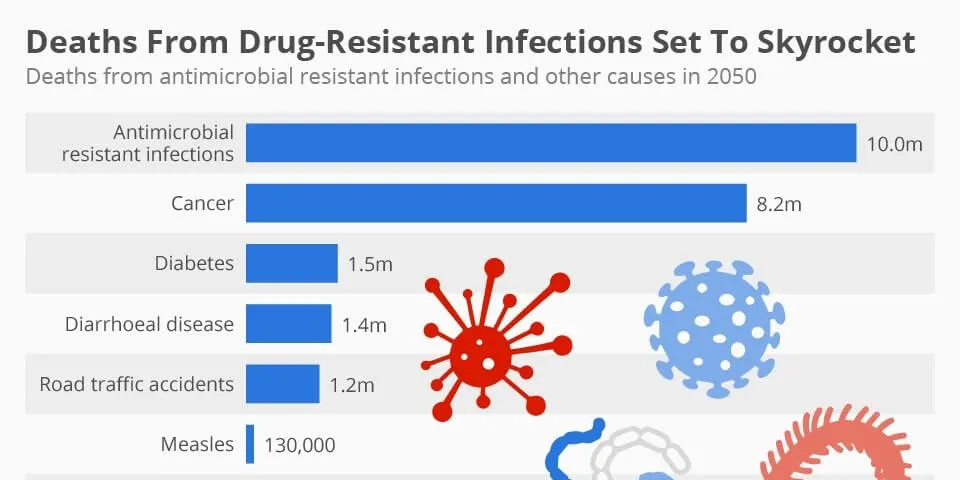Antibiotic Resistance
The fast spreading silent pandemic

The time may come when penicillin can be bought by anyone in the shops. There is the danger that the ignorant man may easily underdose himself and by exposing his microbes to non-lethal quantities of the drug make them resistant.
- Sir Alexander Fleming, the discoverer of penicillin, at his 1945 Nobel Prize lecture
Multiple antibiotic treatments failed for me, and it took me a long time to understand why. My bacteria were resistant to all the antibiotics I had already been given in heavy doses. The resistance of bacteria to antibiotics is a growing problem across the world. This page has all the relevant details I found on antibiotic resistance.
After the discovery of penicillin in 1928, antibiotics became the foundation on which life, as we know it, stands. With the use of antibiotics, infections that used to be life threatening became easily treatable. Antibiotics are broad-spectrum, that is, one antibiotic can kill many different types of bacteria, and they are easy to use.
These properties led to widespread use of antibiotics, which quickly turned to overuse and misuse. In India, antibiotics tend to be prescribed by doctors for almost every problem, even if the reason for the problem is not bacterial in nature. This misuse of antibiotics has made India the nation that is the largest consumer of antibiotics in the world.
These properties led to widespread use of antibiotics, which quickly turned to overuse and misuse. In India, antibiotics tend to be prescribed by doctors for almost every problem, even if the reason for the problem is not bacterial in nature. This misuse of antibiotics has made India the nation that is the largest consumer of antibiotics in the world.
Antimicrobial resistance: clear and present danger
India awoke late to risks of antibiotic overuse and is scrambling to contain the surge in drug resistance.
After years of doing little to tackle the silent but potentially deadly proliferation of antibiotic-resistant bacteria in India, all hell broke loose in 2008, when New Delhi was tacked onto the name of a one such bug.
After years of doing little to tackle the silent but potentially deadly proliferation of antibiotic-resistant bacteria in India, all hell broke loose in 2008, when New Delhi was tacked onto the name of a one such bug.

Play Video
Being the largest consumer also makes India the hotbed of antibiotic-resistant infections. What are antibiotic-resistant infections? When an antibiotic is misused, bacteria, which are highly adaptable and mutate rapidly, start to develop resistance to the antibiotic. The antibiotic kills the bacterial strains that it can, and those that it can’t kill remain in the body, and keep growing.
As more and more strains of bacteria develop this resistance to the antibiotic, the infection caused by them becomes an antibiotic-resistant infection. That means, you can keep taking antibiotics by the dozen for your infection, but it will have no impact on the bacteria that is causing it. A scary situation to be in!
As more and more strains of bacteria develop this resistance to the antibiotic, the infection caused by them becomes an antibiotic-resistant infection. That means, you can keep taking antibiotics by the dozen for your infection, but it will have no impact on the bacteria that is causing it. A scary situation to be in!
Bacteria that become resistant to multiple antibiotics are called superbugs. NDM-1 is a superbug that was first discovered in New Delhi in 2008. In February 2017, the World Health Organization released a list of 12 superbugs – bacteria that tend to cause widespread human infection, and have become resistant to all the known antibiotics.
A study conducted by British researchers warns that unless this problem is solved this urgently, 10 million people would die from antibiotic-resistant infections every year by 2050 (that’s more than the number of people who die of cancer every year!)
A study conducted by British researchers warns that unless this problem is solved this urgently, 10 million people would die from antibiotic-resistant infections every year by 2050 (that’s more than the number of people who die of cancer every year!)
Could viruses called bacteriophages be the answer to the antibiotic crisis?
Surgeon Gabriel Weston visited the Eliava Institute in the former Soviet Republic of Georgia to find out more about a decades-old treatment that could prove vital in the battle against drug resistant superbugs.
Phage Therapy offers a solution to this crisis of antibiotic-resistant infections and superbugs. Phages are present in nature, and are natural predators of bacteria. Bacteria that have developed resistance to antibiotics can still be sensitive to attack from phages. Just like bacteria evolve to develop resistance, phages also evolve to find new ways to attack the bacteria.
And in case a strain of bacteria is found to be resistant to existing strains of phages, new phages can be isolated from nature to attack that resistant strain of bacteria.
And in case a strain of bacteria is found to be resistant to existing strains of phages, new phages can be isolated from nature to attack that resistant strain of bacteria.
If you are unfortunately suffering from an infection that does not seem to go away despite taking antibiotics, or goes away temporarily only to return when you finish your course of antibiotics, then phage therapy may be the solution for you. Please contact us so that we can facilitate phage therapy for you at the leading institute for bacteriophage research and therapy in the world.
